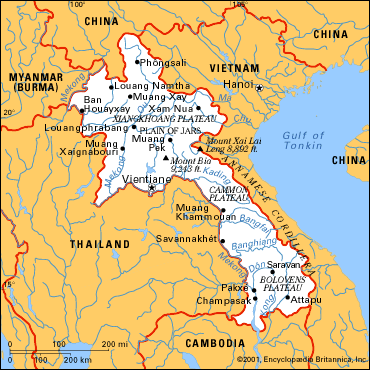|
FPSS wish to thank journalist Jim Pollard for sending these news articles for our members to read.
The last of the main refugee groups in Thailand must be safely and properly repatriated to Laos - only if willing
Issues related to Hmong ethnic rebels said to be fighting a protracted jungle war against the communist government inside Laos and Hmong refugees who have sought shelter in Thailand continue to crop up intermittently. Invariably, these issues involve alleged brutality by the Lao military against the rebels and harsh treatment of the refugees by Thai authorities. More than 30 years after the communist takeover in Laos, the international community, including Thailand, has lost interest in the plight of the Hmong minority groups. This is not surprising. The latest mass surrender to the Lao government of some 400 "rebels" and their dependants in the northern Lao province of Xieng Khouang indicates that the Hmong's decades-long anti-communist struggle is finally winding down.
Hmong ethnic groups led by General Vang Pao fought for the United States against the communist Pathet Lao movement before the fall of Vientiane in 1975. Hundreds of thousands fled the country after the war and were resettled in the US. It is estimated that only a few thousand Hmong rebels continue to be active in the mountainous jungle regions of northern Laos. In the middle of last year, the last group of 15,000 Hmong refugees - who had been sheltered in Saraburi province for much of the past three decades - were finally resettled in the US. Their departure brought a sense of closure for Thailand, as the country could be said to have fulfilled its obligation as a responsible member of the international community in providing humanitarian assistance to refugees and displaced persons.
In the aftermath of the Indochinese war that ended in the mid-1970s, hundreds of thousands of refugees from Laos, Cambodia and Vietnam had passed through Thailand and been given shelter on their way to resettlement in third countries. Thailand's record in playing host to such large numbers of refugees may have been tainted by human rights violations and corruption on the part of some local officials, but on balance this country did, and has done, more than its fair share. It has provided shelter to thousands upon thousands of desperate people fleeing wars, mass murder and political persecution in their home countries. However, that doesn't mean Thailand should turn a blind eye to the recent incident in which 194 Hmong individuals, including those granted "persons of concern" status by the United Nations High Commissioner for Refugees, were summarily rounded up by Thai authorities and put in a detention centre. Aid workers fear these people could be forcibly repatriated to Laos, where they face persecution, imprisonment, discrimination and possibly even death.
Most of the latest batch of Hmong arrested by Thai officials are those who fled across the border into Thailand's Phetchabun province in late 2004 after they heard news of a fresh resettlement plan in the US. Between 6,000 and 8,000 Hmong are now being sheltered in Phetchabun's Ban Huay Nam Khao with little hope of being resettled in the US or other countries.
The fear is that these Hmong could eventually be forced to go back to Laos. The Thai and Lao governments have reached a common understanding that the Hmong are victims of human trafficking syndicates - not refugees. The two countries agreed recently that Hmong in Thailand would be repatriated if there was sufficient proof that they originated from Laos. Some 50 Hmong have already been deported to Laos after Vientiane recognised them as citizens in November. The Lao authorities do not allow international refugee workers to monitor the conditions and whereabouts of Hmong refugees once they are sent back to the country.
Under the circumstances, unless the US plans to take more Hmong now being sheltered in Thailand for resettlement, these people should be returned on a voluntary basis. At the same time, Thailand and Laos, in cooperation with the UNHCR, should put in place a transparent screening process to determine who among the Hmong asylum seekers deserves protection as refugees fleeing persecution, and who should be repatriated to Laos. A monitoring system involving international aid agencies should be established to ensure that all returnees are well taken care of while being reintegrated into Lao society. It must ensure they are not subject to persecution or discrimination.
Thailand, which has done so much for refugees and asylum seekers in the past, must see to it that its humanitarian role is successfully concluded in line with internationally accepted humanitarian standards.
|








